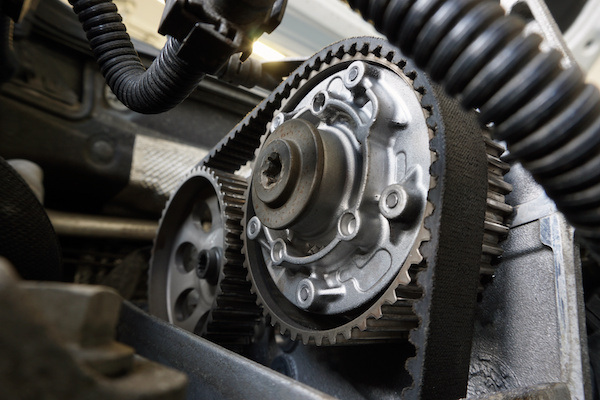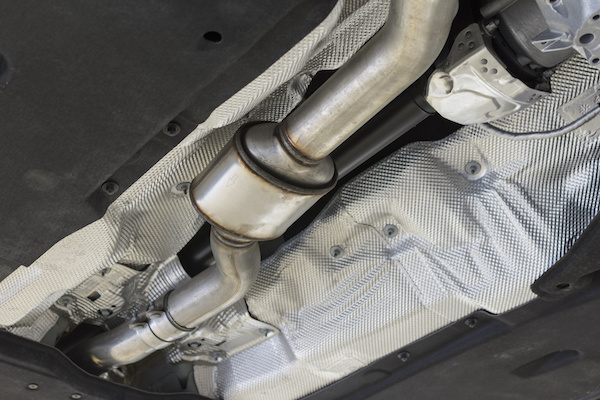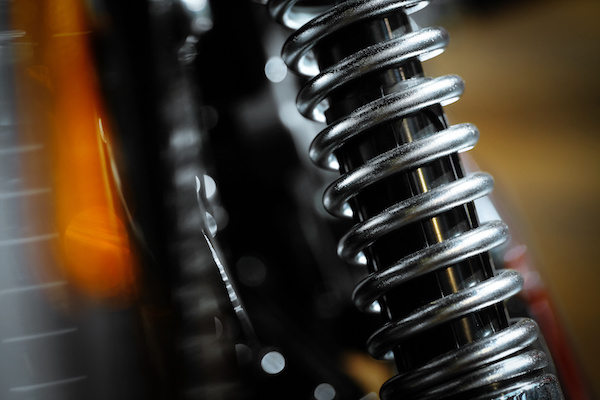Posted on 12/20/2022

The timing belt is one of the most essential components of the engine system. Besides regular inspections, it requires little to no maintenance. The timing belt is a ribbed, rubber belt that connects the crankshaft and camshaft of your engine. It ensures that the cylinder and valves move synchronously to ensure the combustion process goes smoothly. Does Every Vehicle Have a Timing Belt? Most vehicles made in the 2000s or before that have a timing belt. Whereas, most vehicles on the road now have a timing chain instead. The metal chain is more durable and can sometimes last the life of an engine, which is why timing belts are slowly phasing out. If you aren’t sure which one your vehicle has, feel free to look in your vehicle’s handbook to see what is keeping your engine running. When Should I Replace the Timing Belt? Most automakers will specify a mileage interval for when you should replace your timing belt. This is usually between 60,000-100,000 miles. How ... read more
Posted on 11/4/2022
.jpeg)
A shaky steering wheel isn’t just uncomfortable to deal with, but it can be extremely unsafe. This is a tell-tale sign of something wrong with your vehicle, so be sure to bring your car to the local experts at The Model garage in Berkeley, CA as soon as possible. Various car problems are linked to a vibrating steering wheel, and some of them might surprise you. Next time you get the feeling, be sure to look at the timing, any sounds, or the current state of your car. It can help you and your technician diagnose it quicker, later on. 1. Unbalanced Tires One of the most common symptoms of unbalanced tires is an unstable steering wheel. If your tires are the problem, you will feel it in the steering wheel since they are close in proximity. If this were the case, you would notice the shakiness worsening as you accelerate. It will rarely occur when you drive slower than 50mph. To prevent this instability, be sure to keep up with your tire maintenance service. The professional team ... read more
Posted on 10/24/2022
.jpeg)
Brakes are perhaps the most integral components of your vehicle. They keep you, your car, passengers, and other road users safe by allowing you to stop in a blink of an eye. So, if you experience trouble stopping your car in a dime, it might be time to replace your brake pads and rotors. Brake rotors are among the most critical and durable components of the braking system. They are strong, round metal wheels located inside your car tire and attached to the entire system. The brake calipers squeeze the rotors creating massive friction that ultimately brings your car to a quick stop. Well, with continuous use and the incredible friction involved, the rotors are bound to wear out. As a rule of thumb, you should have your brake rotors replaced every 50,000 to 70,000 miles and 10,000 to 20,000 miles for the brake pads to keep your braking system in perfect condition. Factors Affecting Brake Rotor Wear The type of brake rotor Your driving style and conditions The quality of your brake p ... read more
Posted on 9/28/2022

The catalytic converter is in charge of expelling emissions from your vehicle’s motor in a safe manner. If these engine byproducts can’t be emitted properly, your car is at risk of poor efficiency and performance. Read on to learn more about the catalytic converter and how to tell if one has gone bad. The Process of Catalytic Converters The catalytic converter is a major part of the exhaust system that sits underneath most cars. A catalytic converter chemically transforms harmful exhaust emissions like carbon monoxide and other fumes into less toxic vapors. There is a thin metal piece inside the component made to handle this. When the exhaust gasses get pushed through the component, the metal acts as a catalyst to help break down the byproducts. Over time, the “cat” can break down or get clogged. Below are some of the failing signs of a catalytic converter: Check Engine Light On When something goes wrong with the catalytic converter, the oxyge ... read more
Posted on 8/29/2022
.jpeg)
A combustion engine needs three essentials to start and operate: gas, air, and a spark. Spark plugs are the little devices that provide the necessary spark from the pistons to ignite the air and fuel mixture to help your engine run. When they are improperly installed or worn out, your vehicle will stop running. Spark plugs are one of those vehicle components that should be checked on a regular basis. When you bring your car, SUV, or truck to our auto repair shop for service, we can keep you updated on the condition of your spark plugs and replace them before they can become an inconvenience to you. FAQs on Spark Plugs How many spark plugs are in an engine? A four-cylinder engine has four spark plugs, but a V8 has eight. What are spark plugs made of? Copper, nickel, iridium, and platinum are some of the most common elements in spark plugs. There are varieties, and you should follow what your manufacturer recommends. How long do spark plugs last? Spark plugs can las ... read more
Posted on 7/29/2022
.jpeg)
Importance of Reading Your Car's Owner's Manual There are several reasons why every driver should read their vehicle's owner's manual. First and foremost, it is essential for safety. The owner's manual contains critical information about the vehicle's systems and how they work, including information about the brakes, steering, and other safety features. This information can help drivers avoid accidents and stay safe on the road. In addition to safety, the owner's manual can also help drivers save money. Many people don't realize that they can perform basic maintenance and repairs on their own, without having to take the vehicle to a mechanic. By reading the owner's manual, drivers can learn how to do simple things like changing the oil or replacing a tire. This can save a lot of money over time. Finally, the owner's manual is a great resource for troubleshooting problems with the vehicle. If something goes wrong, the manual can help drivers figu ... read more
Posted on 6/27/2022

A working, clean, and powerful air conditioning system is a must-have for drivers in the summer. A broken A/C system can leave you breaking out in a sweat on your commutes. And a smelly A/C system can make the air inside your car unbearable. Read on to learn about air conditioning troubles that drivers commonly experience and what may have caused them. Weak A/C Airflow When your A/C never feels like it is powerful enough, it can be frustrating. It can make you sweat on those hot summer days. If you notice a lack of airflow, it is important that you have your A/C system checked. Below are some of its common culprits: Mildew or mold built up in the evaporator core A loose or cracked hose Malfunctioning ventilation fan Damaged seals Not Cold Enough or Warm A/C There are many explanations for warm air conditioning. If your car's air conditioning feels like it lacks the cooling factor, please bring your car to our auto repair shop for inspections. Below are some of the common rea ... read more
Posted on 5/30/2022

If you are looking to replace your suspension components, it can be difficult to differentiate whether shocks or struts are right for you. In some vehicles, they may even have both. Today, we will explain some distinctions between shocks and struts and how they can improve your vehicle's handling and performance. Shock Absorber A shock absorber, or shock, is a device that dampens the movement of a vehicle's springs. They are responsible for enabling a smooth drive and minimizing wear on other suspension components like your ball joints, bearings, or bushings. By reducing the feeling of bumps on the road, they keep your tires in proper contact with the road. Struts A strut is a structural component that helps support the vehicle's body and keep it level to the ground. Sometimes, shocks can be included in the strut's configuration. Struts work by distributing side-to-side forces from one end of the vehicle to the other. Struts can be found on both the front and rear e ... read more
Posted on 4/29/2022

Whether you're hauling luggage for a road trip or carrying moving boxes for a big move for the spring and summer, you'll need to know how to do it safely. Transporting oversized or heavy items can present major risks, and if you aren't careful, it can get you or others hurt. Moreover, you don't want a ticket for something you can easily avoid. With the proper knowledge and tools, you can easily transport your items. Here are some things you should keep in mind! Clean Everything Out First Before your trip or move-in day, it is especially important that you tidy up your car first. Get rid of any trash or unnecessary items so that it doesn't take up space. Once you have a clean vehicle, it'll make things easier to organize. Size Matters If you own an SUV, truck, or van, you can obviously haul more than a sedan or coupe. You can transport more items and even strap them on top of your vehicle's roof. However, you must know how much all your cargo weighs befor ... read more
Posted on 3/31/2022
.jpeg)
While it may be tempting to skip an oil change due to our busy schedules, doing so can pose harmful risks for your engine. For your car to run smoothly every day, you need to put clean engine oil in it to keep the motor and its parts lubricated. Motor oil helps to minimize friction, prevent corrosion, and maintain a stable engine temperature. Over time, this fluid picks up a decent amount of dirt and grime. That is why it is to get your oil and filter changed on time, every time. The frequency of routine oil services may vary from person to person or car to car. Additionally, the climate and driving habits also play a role. The owner's manual is the best place to find reliable information regarding your oil change intervals, the type of oil required (conventional or synthetic), and much more. Your automaker has recommendations for all your maintenance items, not just your oil changes. By following the manufacturer's specifications, you'll protect your investment an ... read more